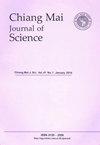The Three-stage High Solid Anaerobic Digestion (TSHS- AD) under Ambient Temperature for Enhanced Biogas Production from Cow Manure
IF 0.8
4区 综合性期刊
Q3 MULTIDISCIPLINARY SCIENCES
引用次数: 0
Abstract
This research aimed to investigate the three-stage high solid anaerobic digestion (TSHS-AD) at ambient temperature. BMP was conducted at the various substrate to inoculum (S: I) ratios of 2:1, 4:1, and 6:1 on a volatile solid (VS) basis, each of which was conducted at different total solid concentrations (15%, 20%, and 30%). The highest methane yield of 343.97 mL-CH4·gVS-1 was achieved at 2:1-S: I ratio and 15 %TS. Meanwhile, TSHS-AD operated at S: I 2:1 and 15 %TS (20g-TS/L-R1) provide a maximum methane yield of 316.09 mL-CH4·gVS-1. The stage separation of TSHS-AD reduces inhibitors in the methanogenesis step. Moreover, it could create a full microbial function in each stage. Accumulation of VFA and semi-continuous feeding have considerable influence in enhancing anaerobic microbes involved in the biogas system. The annual income from biogas has the greatest impact on the investment attractiveness of TSHS-AD, according to the computation of IRR, NPV, and PB. The results obtained in this research could be potentially helpful to scale up the TSHS-AD system.常温下三段式高固体厌氧消化(TSHS- AD)提高牛粪沼气产率
本研究旨在研究常温下三段式高固体厌氧消化(TSHS-AD)。在挥发性固体(VS)的基础上,在不同的总固体浓度(15%、20%和30%)下,以2:1、4:1和6:1的底物与接种物(S: I)比进行BMP。在2:1-S: I和15% TS条件下,甲烷产率最高,为343.97 mL-CH4·gVS-1。同时,在S: I 2:1和15% TS (20g-TS/L-R1)条件下,TSHS-AD的最大甲烷产率为316.09 mL-CH4·gVS-1。TSHS-AD的阶段分离减少了产甲烷步骤中的抑制剂。此外,它可以在每个阶段创造一个完整的微生物功能。VFA的积累和半连续进料对增强沼气系统中厌氧微生物有相当大的影响。根据IRR、NPV和PB计算,沼气年收益对TSHS-AD的投资吸引力影响最大。本研究的结果可能对TSHS-AD系统的扩展有潜在的帮助。
本文章由计算机程序翻译,如有差异,请以英文原文为准。
求助全文
约1分钟内获得全文
求助全文
来源期刊

Chiang Mai Journal of Science
MULTIDISCIPLINARY SCIENCES-
CiteScore
1.00
自引率
25.00%
发文量
103
审稿时长
3 months
期刊介绍:
The Chiang Mai Journal of Science is an international English language peer-reviewed journal which is published in open access electronic format 6 times a year in January, March, May, July, September and November by the Faculty of Science, Chiang Mai University. Manuscripts in most areas of science are welcomed except in areas such as agriculture, engineering and medical science which are outside the scope of the Journal. Currently, we focus on manuscripts in biology, chemistry, physics, materials science and environmental science. Papers in mathematics statistics and computer science are also included but should be of an applied nature rather than purely theoretical. Manuscripts describing experiments on humans or animals are required to provide proof that all experiments have been carried out according to the ethical regulations of the respective institutional and/or governmental authorities and this should be clearly stated in the manuscript itself. The Editor reserves the right to reject manuscripts that fail to do so.
 求助内容:
求助内容: 应助结果提醒方式:
应助结果提醒方式:


